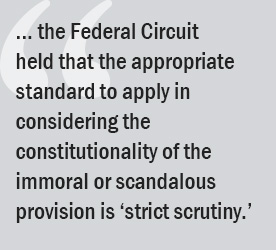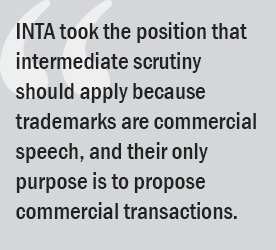International Amicus Committee Update: INTA Files Amicus Brief in U.S. Supreme Court Case on Immoral or Scandalous Marks
Published: April 15, 2019
Claudia Ray Kirkland & Ellis LLP New York, New York, USA
 INTA filed an amicus curiae brief with the U.S. Supreme Court on March 25, 2019, in the case of Iancu v. Brunetti, arguing that the Lanham Act’s prohibition on registration of immoral or scandalous marks violates the First Amendment of the U.S. Constitution.
INTA filed an amicus curiae brief with the U.S. Supreme Court on March 25, 2019, in the case of Iancu v. Brunetti, arguing that the Lanham Act’s prohibition on registration of immoral or scandalous marks violates the First Amendment of the U.S. Constitution.
Background
Section 2(a) of the Lanham Act bars registration of any trademark that “[c]onsists of or comprises immoral, deceptive, or scandalous matter; or matter which may disparage or falsely suggest a connection with persons, living or dead, institutions, beliefs, or national symbols, or bring them into contempt or disrepute ….” 15 U.S.C. § 1052(a).
In
Later that year, in In re Brunetti, 877 F.3d 1330 (Fed. Circ. 2017), the Federal Circuit concluded that the Section 2(a) companion provision prohibiting registration of immoral and scandalous marks likewise is unconstitutional. The Supreme Court accepted
Brunetti: Determining Scrutiny Standards
Directly at issue in Brunetti is whether the USPTO may refuse to register the FUCT trademark for clothing, based on the immoral or scandalous provision. The examining attorney refused registration, finding that FUCT mark is vulgar and thus scandalous. Reconsideration was denied, and the Trademark Trial and Appeal Board affirmed.
 On appeal, the applicant argued that (1) the FUCT trademark is not vulgar; (2) even if it is vulgar, Section 2(a) does not expressly bar vulgar marks; and (3) the immoral or scandalous provision is unconstitutional. The Federal Circuit found the FUCT trademark to be vulgar and therefore scandalous, but that the provision was unconstitutional. Although the Federal Circuit found the use of “vulgar” marks “discomforting,” it concluded that the immoral or scandalous provision “impermissibly discriminates based on content.”
On appeal, the applicant argued that (1) the FUCT trademark is not vulgar; (2) even if it is vulgar, Section 2(a) does not expressly bar vulgar marks; and (3) the immoral or scandalous provision is unconstitutional. The Federal Circuit found the FUCT trademark to be vulgar and therefore scandalous, but that the provision was unconstitutional. Although the Federal Circuit found the use of “vulgar” marks “discomforting,” it concluded that the immoral or scandalous provision “impermissibly discriminates based on content.”
In reaching that decision, the Federal Circuit held that the appropriate standard to apply in considering the constitutionality of the immoral or scandalous provision is “strict scrutiny.” Strict scrutiny is the most rigorous and speech-protective of the various standards used in free speech cases. A less rigorous test, known as “intermediate scrutiny,” applies in cases involving commercial speech. Central Hudson Gas & Elec. Corp. v. Public Service Commission of New York, 447 U.S. 557 (1980).
The Federal Circuit found that the prohibition on registration of immoral or scandalous marks did not meet the strict scrutiny standard. The appeals court also concluded that the provision would be unconstitutional even if subjected to intermediate scrutiny.
INTA’s Brief: The Case for Intermediate Scrutiny
INTA submitted a brief in support of the respondent. INTA took the position that intermediate scrutiny should apply because trademarks are commercial speech, and their only purpose is to propose commercial transactions. Because a trademark may still be used in commerce even if registration is denied, INTA explained, the Section 2(a) prohibition on registration of immoral or scandalous marks would not fully restrict speech, and thus intermediate scrutiny is appropriate.
Addressing Central Hudson‘s four-part test for intermediate scrutiny, INTA argued that, although the government met the first prong (whether the speech concerns lawful activity and is not misleading), it failed to meet the remaining three prongs because the asserted government interest was not substantial (second prong), the regulation did not directly advance that interest (third prong), and the regulation was not more extensive than necessary (fourth prong).
Regarding the second factor, INTA argued that (1) the government’s stated interest in protecting the public from immoral and scandalous speech is inadequate; (2) its interest in promoting the orderly flow of commerce is not substantial because immoral or scandalous marks that shock customers might still serve as important indicators of source; and (3) because trademarks are not government speech, the government has no interest in dissociating itself from the trademarks it registers. As to the third factor, INTA asserted that the immoral or scandalous provision is so inherently vague, and has been so inconsistently applied, that the government cannot credibly argue that it directly advances any government interests. Finally, regarding the fourth factor, INTA noted that the government failed to demonstrate that the provision was narrowly tailored because determinations about morality are left to individual examiners who have applied the provision inconsistently and arbitrarily.
INTA also argued that the provision is unconstitutionally void for
INTA’s amicus brief in Brunetti was written by David H. Bernstein (Counsel of Record for INTA in the U.S. Supreme Court), Jeremy Feigelson, Pooja A. Boisture, Michael C. McGregor, and Jaime M. Freilich (all of Debevoise & Plimpton LLP, New York, New York, USA), David Donahue (Fross Zelnick Lehrman & Zissu, P.C., New York, New York, USA), and Claudia Ray (Kirkland & Ellis LLP, New York, New York, USA).
Although every effort has been made to verify the accuracy of items in the INTA Bulletin, readers are urged to check independently on matters of specific concern or interest.
© 2019 International Trademark Association